Director’s Notebook:
Even though it was my first time going into the International Cooperation Development Fund (ICDF), when I was covering the Pacific Island nation of Kiribati in 2008, I saw the technological prowess of the ICDF Technical Mission as they were growing beautiful fruit and vegetables in soilless, saline conditions. In addition, I witnessed ICDF youth volunteers brave the scorching equatorial sun, go to a place dubbed “the end of the earth,” and lend a hand to this island nation at risk of disappearing due to rising sea levels induced by climate change.
My time with ICDF Secretary General Stephen J. H. Lee didn’t feel much like an interview. Rather, it felt more like a diplomat and a documentary film-maker sharing their experiences in Myanmar. I was in Myanmar in 2008 covering disaster relief efforts after Cyclone Nargis, while Secretary-General Lee, serving as an ambassador, was there over 10 years later navigating the challenges of the COVID-19 pandemic and military coup. Thanks to Lee’s experience, wisdom, and compassion, he remained in the country despite these dire conditions to provide a lifeline for countless Taiwanese and foreign nationals.
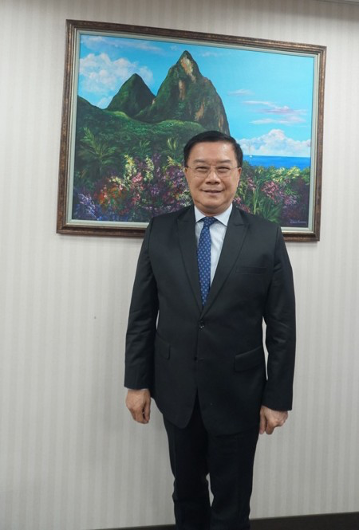
Picture 1: Secretary General Lee introducing the artwork in his office from a well-known Taiwanese film (Photo taken by Pei Lin-lin)
From Bananas to CherryTomatoes - A Diplomat Turned Master Farmer
When I was doing background research for my interview, I quickly found that Secretary General Lee had extensive experience being stationed overseas in places such as Grenada, the United States, the United Kingdom, Saint Lucia, Indonesia, India, and Myanmar. Once Secretary Lee started telling his stories from traversing the world as an ambassador, his impressive background became quite clear quite quickly.
Secretary General Lee smiled when he said, “I’m not your average diplomat. Wherever I go I learn by doing. For instance, When I was in Saint Lucia, the agricultural cooperation model I established helped them keep growing bananas that supermarkets in London vie to get their hands on.” Secretary General Lee mentioned that even though Saint Lucia was a banana-producing country, back then, it still had to purchase banana seedlings from abroad at a cost of 75 cents per plant. When Lee was in Saint Lucia, the country needed seedlings for 400,000 plants a year. That meant the local government had to allocate over US$300,000 annually to buy seedlings for farmers. The country agreed they needed to find a way to alleviate this heavy financial burden.
After understanding the importation of seedlings in Saint Lucia as well as production and marketing models, the Taiwanese embassy, selected local scientific talent to pursue master's and doctoral degrees at the National Pingtung University of Science and Technology in Taiwan. After completing their studies, they returned to Saint Lucia, taking on roles as the director and deputy director of the Tissue Culture Laboratory. In just two to three years, these researchers successfully eliminated the need for Saint Lucia to import seedlings from abroad at a cost close to tens of millions of New Taiwan Dollars. Moreover, by aligning with British production and marketing systems, they assisted farmers in producing and marketing high-quality bananas through organic cultivation, packaging, pasteurization, and transportation.
Going back a bit, Secretary General Lee even impressed local farmers during his first stint overseas. He told me about his time in Grenada, a country that most Taiwanese don’t know much about. During that assignment, he helped set up an agricultural technical mission. He had his team urge local farms to plant cherry tomatoes because Lee saw that many cruise ship tourists came from the US and Europe. Initially, the farmers found the suggestion hard to believe. “Who is going to buy your tiny tomatoes,” they asked. After the harvest, helping farmers sell these tiny tomatoes also posed a significant challenge. Pricing, an art in and of itself, was particularly tricky. When the farmers heard that Taiwanese experts recommended pricing a box at seven Grenadian dollars, which is a little over two US dollars, they were even more surprised. Many farmers said, “So tiny, yet so much money. No one is going to buy these.”
Back then, their strategy was to place 20 boxes front-and-center in stores around the island, and then go home to wait for the phone to ring. As Lee expected, it didn't take long for people to start calling. Store owners frantically contacted the Taiwanese diplomatic mission to ask if there were any cherry tomatoes around for immediate resupply. Thus, the price of the second batch of cherry tomatoes rose to nine Grenadian dollars. The entire team understood that they needed to restock quickly as cruise ship tourists only had a short time on land. They also focused more on how their buyers perceived their product over how much they were charging. From packaging and pricing to sales, Lee’s team had to manage every step along the way. Thankfully, the entire team were experts at the time and the head of the agricultural technical mission held a Ph.D. This group provided practical assistance to increase farmer’s income while bolstering agricultural technology as an ally to Taiwan. This collaboration also bore the fruit of something much more important; trust and gratitude.
Making Friends through Farming - Using Smart Agriculture to Help New Southbound Allies
In addition to his countless stories, Secretary General Lee also mentioned that Taiwan’s prowess in agricultural technology has garnered international recognition for many years. Currently, ICDF has ongoing cooperative projects in New Southbound countries such as Thailand, Indonesia, and the Philippines. The projects include horticultural production and marketing and sales as well as topics that countries under the threat of climate change urgently need such as adapting to changing weather conditions, increasing resilience, and bolstering food security. In particular, the Philippines will start a demonstration farm in mid-November.
Food production has always been of critical importance to Indonesia, a country of over 270 million people. Therefore, ICDF sent Taiwan’s top agricultural experts to help the country in rice production. In a mere three years, the ICDF helped Indonesia’s fourth-largest region for rice cultivation (South Sulawesi) increase its yield by 10%. The team also introduced Taiwan’s strengths in smart agriculture and data analytics while integrating meteorological information related to agriculture. Through technology, these efforts helped mitigate the risks of traditional farming methods while increasing the agricultural output of a New Southbound country.
This July Secretary General Lee signed a new Taiwan-Thailand Technical Cooperation MoU with the Royal Project Foundation of Thailand. In the northern part of the country, Thailand is also looking forward to introducing Taiwan’s smart agriculture application systems. In addition to applying precision agriculture concepts, this MoU will utilize efficient irrigation to conserve water and establish the best models of cultivation for different crops through statistical integration. By connecting Thailand to ICDF-promoted meteorological monitoring for agriculture, the MoU will provide a more scientific approach to farming that accounts for temperature and soil moisture levels and help farmers understand the individual needs of crops in different regions.
The Healthy Seed Production Project is another notable collaboration between ICDF and the Royal Project Foundation of Thailand. At the time, severe diseases were impacting crops in Thailand such as sweet potatoes and flame lilies. In the past, the Royal Project Foundation was relatively unsuccessful in removing these diseases through tissue culture technology. Thus, ICDF selected several Taiwanese agricultural experts to go to Thailand to help resolve the issue. The Taiwanese team provided guidance and optimized the tissue culture techniques of the Royal Project Foundation. This collaboration increased the yield of healthy seeds, bolstered production, and boosted household income.
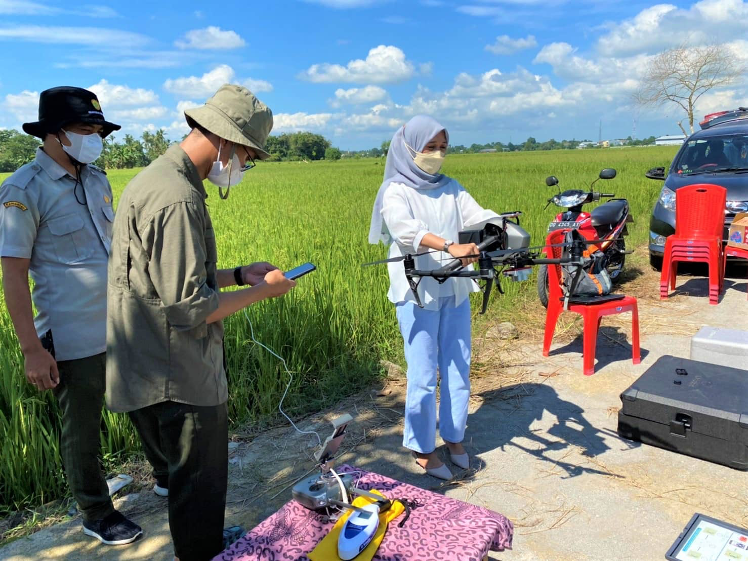
Picture 2: ICDF instructing Indonesian farmers on pre-flight signal calibration of drones (Courtesy of ICDF)
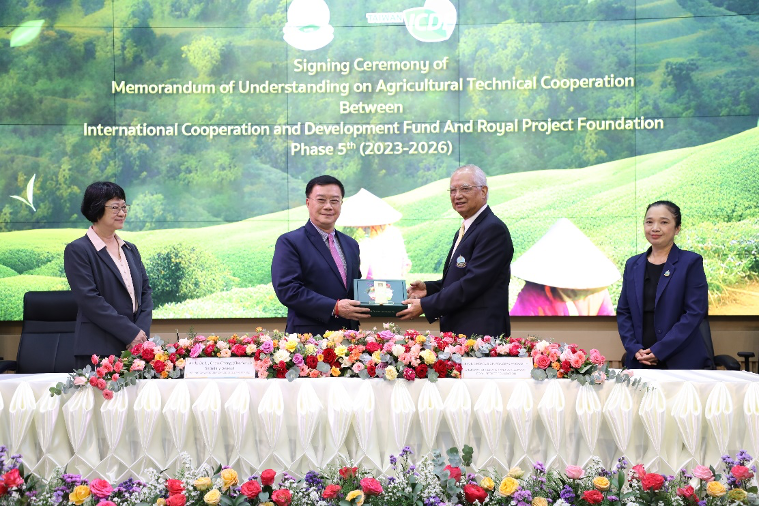
Picture 3: ICDF and the Royal Foundation Project of Thailand Signing the 5th Agriculture Cooperation MoU (Courtesy of ICDF)
The ROC Flag Becomes a Beacon of Hope in Myanmar During the Recent Pandemic and Military Coup
Before becoming the Secretary General of ICDF, Stephen J. H. Lee served as the ambassador of Myanmar for three years. During his tenure, he encountered the COVID-19 pandemic as well as a coup. Most people think Lee’s experience would be miserable. However, during my interview, Lee told me he never lost his goodwill, warmth, and positivity while being stationed abroad.
Thinking back on his experience, Secretary General Lee said, “Working in Myanmar was completely different than any other country. The people there were simple and pious. Every morning, the first thing they did was pray. I was also moved by the alms the people gave to novice monks and bhikkhus.”
In 2020, the world was hit by a serious pandemic, and shortly after, Myanmar experienced a coup. Other ambassadors were either downgraded or left the country. Taiwan’s representative office was the only embassy to stay open the entire duration of the coup. Secretary General Lee said they were able to stay by remaining steadfast to the principle given to them by the Ministry of Foreign Affairs, which was “Stay at your post and protect the people.” At the beginning of the coup, many factories faced a life-or-death situation because there were rumors circulating online that the resistance forces had compiled a hit list. The resistance forces were supposedly going to burn down Chinese-funded factories because China supported the military government and the management of many Chinese companies treated their local workers unfairly. However, many locals didn’t know which factories were funded by China, and which were funded by other countries such as Taiwan, Singapore, or Malaysia. At the time, the ethnically Chinese diaspora community faced a grave crisis and was deeply fearful of dangers such as blackmail, bombing, and arson.
As ambassador, Lee reported this immediately to the Ministry of Foreign Affairs. The following day, Minister of Foreign Affairs Joseph Wu convened a press conference and asked Taiwanese businesses in Myanmar to fly the ROC flag. Then the Ministry sent 100 large (120x180 centimeter) flags from Thailand and Singapore into Myanmar. In addition, Minister Wu asked the Taiwan Chamber of Commerce to print weather-resistant Myanmar and ROC flags. Ambassador Lee also personally chaired an online meeting with the Taiwanese business community to deploy security measures. Shortly after, over four hundred flags were shipped. It's said that after Taiwanese businesses started flying the ROC flag, Chinese businesses also asked for flags too as they promised security in a time of crisis.
During the first wave of arson, around thirty Chinese businesses were burned to the ground. Taiwanese businesses not only got through the crisis unscathed, but thanks to Ambassador Lee’s leadership, business continued as usual. The businesses didn’t have to lay off workers, and convinced people to stay who wanted to return home. Ambassador Lee was able to represent the interests of Taiwanese businesses while conducting sincere dialogue with both the military government and the resistance forces. Thanks to Lee’s efforts, not one Taiwanese business had to leave Myanmar, some of which employed thousands of people. Both the military government and resistance forces guaranteed their safety, which allowed Taiwanese businesses to keep making and shipping goods. As such, Taiwanese businesses and the representative office became a stabilizing force in Myanmar amidst a coup.
After Taiwanese businesses were taken care of, Lee saw that there were many displaced people due to the unrest throughout the country. Thus, Lee and his wife provided free lunches to the people of Myanmar with their own money. After ensuring that the military wouldn’t treat them as revolutionary forces, Lee encouraged Taiwanese businesses, and overseas Taiwanese to go to places in need and work with NGOs. Lee and his colleagues helped the most vulnerable parts of the population get through the crisis by handing out at least 1000 free lunches each time they went out.
When talking about Taiwan’s aid to Myanmar, we should back up even further to the 2018 Rural Myanmar Micro-centralized Power Station Pioneer Project when ICDF went deep into the countryside of Myanmar. Many local residents didn’t have electricity in the past and had to rely on gas lamps and candles. Thus, ICDF crossed mountains and forded valleys on muddy roads to help set up an electricity system. ICDF joined hands with the locals to install solar panels and connect power lines to the houses of everyday people. Thanks to everyone’s hard work, the kids of this rural area finally had the light needed to study after the sun went down.
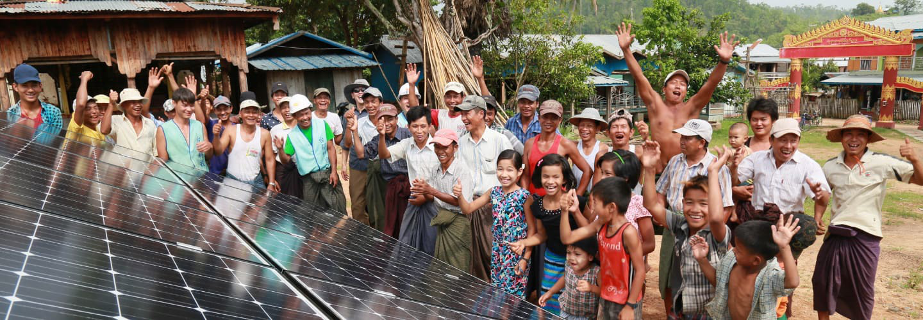
Picture 4: Rural Myanmar Micro-centralized Power Station Pioneer Project (Courtesy of ICDF)
Thanks to sincere effort and longstanding partnerships, it’s no wonder that Secretary General Lee said, “Wherever we went in Myanmar, everyone gave us a thumbs up when they heard the word Taiwan. On the street, when people found out we were from Taiwan, they’d run up and thank us.”
Taiwan has a strong technological base. For many years, through various foreign aid projects, Taiwan has also used these strengths to help the economic and social development of New Southbound countries. In addition, Taiwan has made an effort to connect to New Southbound countries through this type of “warm power”. I firmly believe that these seeds of goodwill have taken root, sprouted, and are now blooming throughout Southeast Asia.
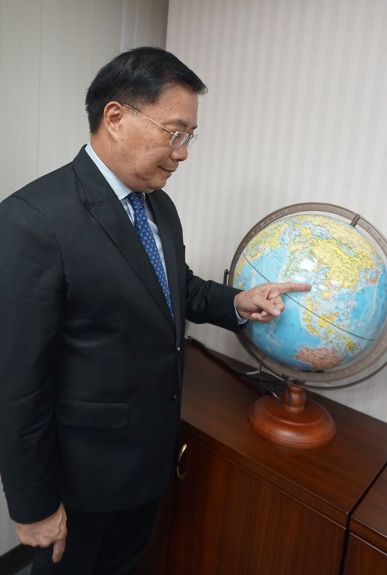
Picture 5: Secretary General Lee pointing to a region of close cooperation, Southeast Asia (Taken by Pei Lin-lin)
Columnist
.png) Pei-lin Lin
Pei-lin Lin
Pei-lin Lin obtained her B.A. in Philosophy from Fu Jen University and her M.A in Political Science from National Taiwan University. Lin embodies a humanistic literacy and political sensibility. In recent years, Lin has collaborated with the Taiwanese government to shoot videos promoting various policies. Currently, Lin splits her time between running a Chan Lands Ltd., Zongdipan, making documentary films and hosting the podcast “Human Translation Machine.” In the past, Lin has been a reporter for several media outlets and the anchor of shows on TVBS, CBC and Da Ai Television. While at Da Ai Television, Lin’s piece “Muhammad Yunus- Savior of the Poor,” was nominated at the First Taiwan Golden Wheel Awards for Outstanding Television News Feature.